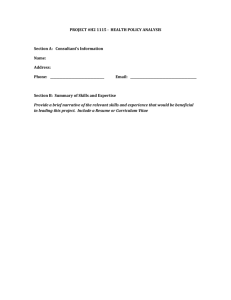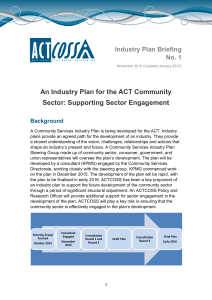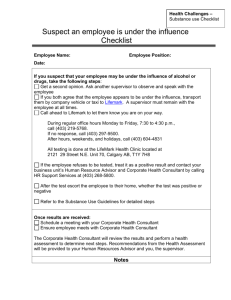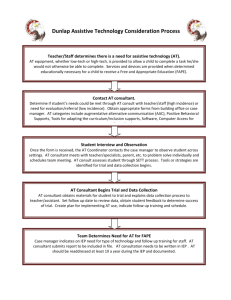Waste Action Collaborative of Sullivan County
advertisement
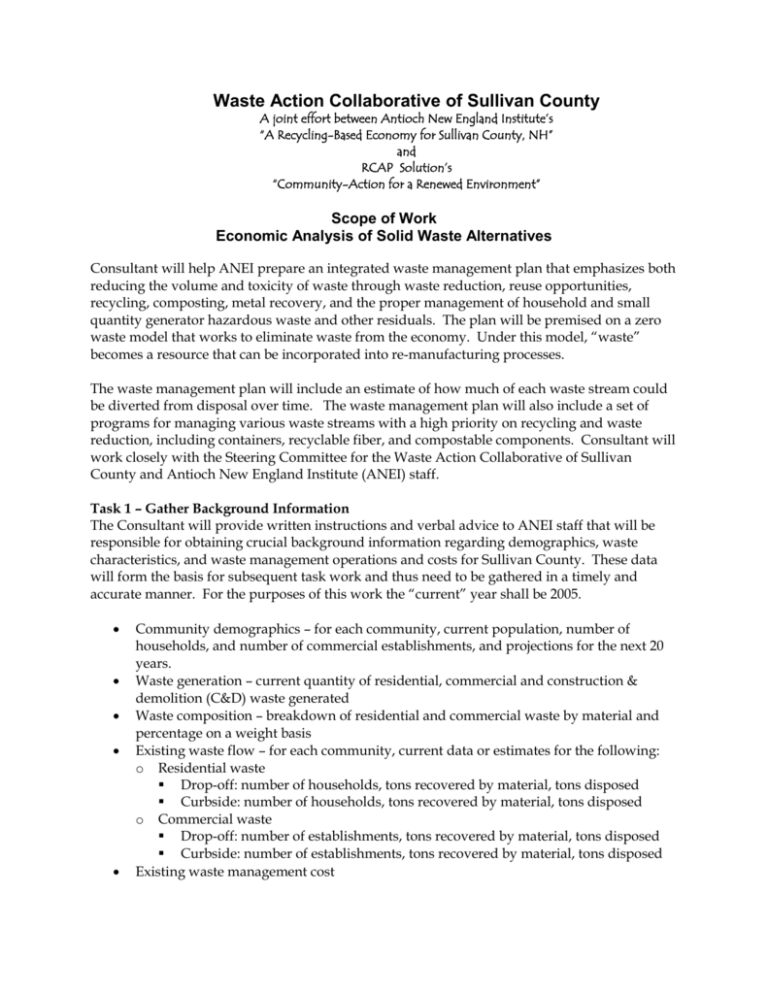
Waste Action Collaborative of Sullivan County A joint effort between Antioch New England Institute’s “A Recycling-Based Economy for Sullivan County, NH” and RCAP Solution’s “Community-Action for a Renewed Environment” Scope of Work Economic Analysis of Solid Waste Alternatives Consultant will help ANEI prepare an integrated waste management plan that emphasizes both reducing the volume and toxicity of waste through waste reduction, reuse opportunities, recycling, composting, metal recovery, and the proper management of household and small quantity generator hazardous waste and other residuals. The plan will be premised on a zero waste model that works to eliminate waste from the economy. Under this model, “waste” becomes a resource that can be incorporated into re-manufacturing processes. The waste management plan will include an estimate of how much of each waste stream could be diverted from disposal over time. The waste management plan will also include a set of programs for managing various waste streams with a high priority on recycling and waste reduction, including containers, recyclable fiber, and compostable components. Consultant will work closely with the Steering Committee for the Waste Action Collaborative of Sullivan County and Antioch New England Institute (ANEI) staff. Task 1 – Gather Background Information The Consultant will provide written instructions and verbal advice to ANEI staff that will be responsible for obtaining crucial background information regarding demographics, waste characteristics, and waste management operations and costs for Sullivan County. These data will form the basis for subsequent task work and thus need to be gathered in a timely and accurate manner. For the purposes of this work the “current” year shall be 2005. Community demographics – for each community, current population, number of households, and number of commercial establishments, and projections for the next 20 years. Waste generation – current quantity of residential, commercial and construction & demolition (C&D) waste generated Waste composition – breakdown of residential and commercial waste by material and percentage on a weight basis Existing waste flow – for each community, current data or estimates for the following: o Residential waste Drop-off: number of households, tons recovered by material, tons disposed Curbside: number of households, tons recovered by material, tons disposed o Commercial waste Drop-off: number of establishments, tons recovered by material, tons disposed Curbside: number of establishments, tons recovered by material, tons disposed Existing waste management cost o o Community services – description of services covered by public funds and current budget Private services – description of services provided by private sector and current costs for services The Consultant will compile the information provided by ANEI into a series of spreadsheets and summary tables that will form the basis for subsequent task work. Task 2 – Selection Waste Management Options The Consultant will facilitate a process with Steering Committee members to identify a range of preferred management options for different components of the waste stream, including recyclable and compostable materials, and management of residual matter. This work will focus on conducting two work sessions with the Steering Committee as described in the following subtasks. Technical and logistical support will be provided by ANEI. Task 2.1 – Phase I Prior to conducting the work session, the Consultant will complete the following with input and assistance from ANEI: Identify and define major solid waste systems (e.g. collection, diversion, processing, transfer and disposal systems) Identify waste stream components (e.g. recyclable and compostable materials) Prepare draft exclusionary criteria (a series of criteria that will be used to identify major systems that are not viable for the Sullivan County) Prepare draft criteria and matrix for evaluating and ranking waste stream components Prepare briefing material for distribution to Committee The objective of the work session is to accomplish the following: Discuss major solid waste systems Revise exclusionary criteria as needed Eliminate non viable systems Discuss waste stream components Revise ranking criteria and matrix for waste materials Evaluate and rank materials for diversion and disposal Describe Phase II evaluation process and present draft criteria Revise criteria and matrix for Phase II Task 2.2 – Phase II Prior to conducting the work session, the Consultant will complete the following with input and assistance from ANEI. Information gathered in Task 1 is critical to completion of this work. Identify appropriate programs and facilities for viable major systems (e.g. practical and state-of-the-art options for rural and urban collection of recyclables targeting high ranking materials as determined in Phase I) Establish performance parameters for programs and facilities (e.g. participation and capture rates, relatively environmental impacts, and generic per ton costs and revenues) Conduct initial Phase II matrix analysis Prepare briefing material for distribution to Committee 2 The objective of the work session is to accomplish the following: Describe appropriate programs and facilities and present initial analysis Discuss and revise list of appropriate programs and facilities Evaluate and rank appropriate programs and facilities Task 2.3 – Phase III Utilizing the results of previous task work, the Consultant will identify two comprehensive integrated waste management systems based on the highest ranking programs and facilities. The Consultant will prepare waste flow models for these systems, e.g. quantities diverted and disposed; methods of collection, processing and disposal; and generic cost estimates. The Consultant will present this information to the Steering Committee in a third work session with the Steering Committee. The objective of the work session is: Refine and finalize the two comprehensive integrated waste management systems Discuss and finalize the parameters for the economic and sensitivity analysis Task 3 – Conduct Economic Analysis The Consultant will conduct an economic analysis of the two waste management systems identified by the Steering Committee. The analysis will include an assessment of the life-cycle costs, including capital/operating costs and projected cash flow requirements. The analysis will assess the impact of different recycling diversion levels as well as other sensitivity analyses identified by the Committee such as fuel and energy costs. The Consultant will identify and briefly describe economic development opportunities that promote regional partnerships for waste management and maximize job creation opportunities through collection, processing, and re-manufacturing of recyclable and compostable materials. The Consultant will present findings of the economic analysis to Steering Committee, collect comments, and make revisions to the analysis, as necessary. 3

